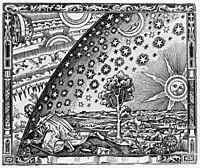Arcane Arts
The Arcane Arts | |
|---|---|
 Pumpernickel's Vision by Luther Ziegler | |
| Abbreviation | TA |
| Type | Religion |
| Classification | Atheistic |
| Scripture |
|
| Governance | Franmark Academy |
| Language | Nisser |
| Headquarters | Franmark |
| Origin | 700CE |
| Other name(s) | The Arcane, Arcanism |
The Arcane Arts, also known as The Arcane, Arcanism, or externally often known as Nisser Mythology, is the traditional system of beliefs within the Republic of Nisserige. In its modern form, the belief system originated in the 8th century CE when Sage Pumpernickel wrote about his mystical findings in an anthology titled The Sorcerer, which was the first written record of the belief system and helped standardize it across the greater Nisser region. The system likely has existed for centuries prior to the writings of Pumpernickel, spanning back to at least the 3rd century. During the era of Communist Nisserige, the religion faced prosecution in Chancellor Philip Flischer's attempt to create a perfectly secular Nisser nation. Despite his attempts, the Arcane Arts remains as Nisserige's most popular belief system.
Throughout the centuries, and even after the publication of The Sorcerer, the religion faced much internal conflict and disagreement, primarily between practitioners of differing Divinities, or followers of differing Houses. Despite these disagreements, there is still a tangible canon, comprised of a collection of several writings by the Seven Wise Sages, that is mostly agreed upon by the majority of Arcanists.
Arcanism is often described as an atheistic religion because the religion does not have a divine figure or figures at its helm, and most practitioners of Arcanism do not believe in any god or pantheon. The most iconic belief of Arcanism is the belief in Magic, or the Arcane, as a natural force of the world similar to gravity. Much of the writings within Arcanism are focused on how practitioners can hone magic and use it in their everyday lives. Several motifs, symbols, and other icons surrounding magic have appeared consistently alongside the belief system across the centuries.
After the death of all of the Seven Sages, Arcanism usually had various Wizards, which were gnomes with great knowledge over the Arcane. During the era of Communist Nisserige, Wizards were prosecuted, so many chose to go into hiding for several decades. At the end of the Communist era in 1950, there were no longer any living Wizards left it, and so it transitioned more into a more personal belief system, detached from organization. During the 1980s and 90s, interest in the belief system began to rise, and many universities began offering theology courses in the Arcane. The title of Wizard resurfaced into use, but this time it was usually given to people who gained degrees in arcane theology courses supervised by the Board of Wizardry.
Etymology and Terminology
The word Arcane most likely comes from the old Nisser word Arca, meaning esoteric or difficult to understand. The word Arcanism is a modern word derived from an exonym given to the Arcane Arts from those in Concord.
The Sages are seven wizards, authors, and contributors to the Arcane Canon who all existed contemporarily.
Wizard is a title given to those by the Board of Wizardry for academic achievements in the study of the Arcane Arts.
Divinities are topics of study within the Arcane Arts that usually focus on one specific subject or section of the Arcane Canon.
Houses was a historical term to describe congregations of like-minded practitioners in the Arcane Arts who, more often than not, shared divinities in common.
A Practitioner of the Arcane, or Practitioner for short, is the most common term used to describe believers in the Arcane in academic texts. Arcanists is an exonym given to Practitioners.
History
Pre-Arcane Canon
Seven Wise Sages

Era of Wizardry
Prosecution under Communist Nisserige
Modern Arcane Practice
Beliefs
Practitioners of the Arcane across the greater Nisser region tend to share a basic set of beliefs and traditions, but oftentimes differ in interpretation of the texts within the Arcane Canon.